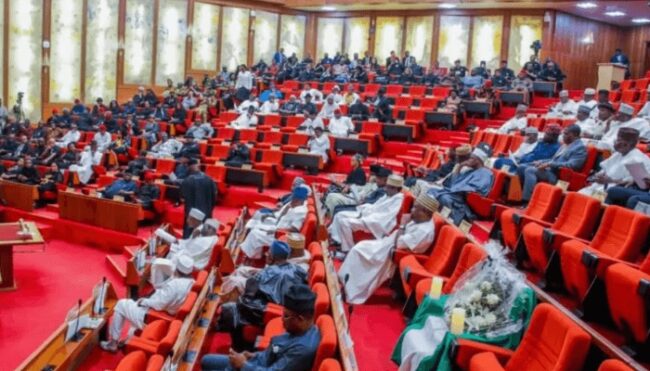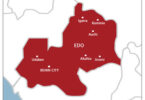On Tuesday, the Senate urged the federal government to address the impending food crisis in the country and promptly inform Nigerians about the measures taken.
The resolution of the Red Chamber followed a motion titled “Urgent Need to Address Food Insecurity and Market Exploitation of Consumables in Nigeria,” sponsored by Senator Sunday Karimi of Kogi West and co-sponsored by Senator Ali Ndume, representing Borno South and Chief Whip of the Senate.
The Senate noted that over the past few months, prices of goods and household consumables have seen a significant rise in the country, leading to high inflation rates, weakened purchasing power, and a general deterioration in the living conditions of the vast majority of Nigerians.
Lawmakers further highlighted that recent data from Nigeria’s National Bureau of Statistics shows food inflation has skyrocketed to 40.66 percent year-on-year, a sharp increase from the 24.82 percent recorded in May 2023.
The Senate declared its awareness that the current market prices of food items such as beans, maize, rice paddy, yam, tomatoes, and onions, which initially rose by about 40% following the removal of petroleum subsidies, have now increased by over 100% to 300%, without any clear reason for these price hikes.
ALSO READ: Kogi CP presents over N19m to families of deceased officers
Lawmakers, in their individual presentations, raised alarms about the dire consequences if the current situation of high food prices, caused by scarcity of farm produce, persists.
Former Senate President and Senator Ahmad Lawan of Yobe North cautioned that Nigerians are losing patience and may soon revolt against the political elite:
“Mr. President, patience and tolerance are elastic but not eternal. Our people are facing real hunger. In my senatorial district, I have seen ordinary people suffering, struggling to find food, and now eating only once a day. Today’s media reports indicate the government is considering removing taxes on food items.
This Senate must engage with the government. What are the issues? We have no food reserves; the government knows the silos are empty. To import, we need foreign exchange. We must engage this administration.”
“Mr. President, we, including members of the House of Representatives, are the most vulnerable. If we do not take action, our citizens, facing increased fuel prices, electricity costs, and food shortages, will show us things we do not want to see in our streets. We must take the right actions to ensure food security. We cannot take the people for granted for too long.”
Senator Ahmed Wadada of Nasarawa West echoed similar concerns and called on the Senate to convene with critical stakeholders to address the food insecurity challenge:
“The issue at hand is very serious. Nigerians are very patient, but no people can endure hunger for so long. While we understand the causes, we must also recommend solutions to the government of the day. As representatives of the people, we are responsible and must respond appropriately.
We are all leaders and critical stakeholders in this country. Whatever we need to do, we must always contribute to efforts to reduce factors affecting food production in the country.”
Co-sponsor of the motion, Senator Ali Ndume, identified the connection between the herders-farmers crisis and food scarcity in the country:
“Here in the North, we are already seeing hunger. People cannot go to their farms. Even in the South East and South West, there are conflicts between farmers and herders. The prices of basic food items are high. As representatives of the people, we need to take action or speak out. I believe we should support this motion and consider its proposals. This is the first time Nigeria is being included among nations facing a food crisis.”
Chairman of the Senate Committee on Agriculture, Senator Saliu Mustapha, informed his colleagues that the Ministry of Agriculture has allocated 60 trucks of fertilizers for distribution to the 36 states of the Federation.
In his closing remarks, Senate President Godswill Akpabio, while commending the mover of the motion, emphasized that the government “must explore every avenue to ensure Nigerians can farm. Nigerians must eat. The primary function of government is the welfare and security of its citizens.”







